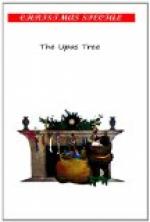“Helen, you have told me all about those little huts twice already, during the last half-hour. Only, last time you had seen one called ‘Runnymead,’ and another called ‘The Limes.’ Presently, if you like, we will walk along and read all the names. It is just the kind of thing which would appeal to our joint sense of humour. But first you must answer a few more questions. Helen—where is my ’cello?”
“At home, Ronnie.”
“Was it broken?”
Helen looked distressed. “No, darling, it was not injured at all. It is safely put away. Look how the sunlight sparkles on those distant ripples!”
“I have finished with the ripples thank you, darling. Helen, I know I’ve been desperately ill. But I’m all right now, and I want you to tell me all about it.”
He saw her glance past him, at the man who sat reading on the next seat.
“Don’t worry about him,” he said. “He can’t overhear. If you think he can, let’s move on.”
“No, no!” said Helen, quickly. “We are so cosy here in the sunshine. Ronnie, do you see those—”
“No, dear,” he said, “I don’t! At this moment I see nothing but you. And I decline to have my attention drawn any more to the exciting things to be seen on the shore at Hazelbeach in winter.... Oh, yes, I knew it was Hazelbeach! Five years ago I spent a jolly week here with some friends. We hired a little wooden hut and called it ‘Buckingham Palace,’ I remember.”
He slipped his hand into her muff, capturing both hers.
Her look of anxiety and alarm went to his heart. He had never seen Helen frightened before; and he knew with unerring instinct that she was afraid—of him.
It was hard; for he was desperately tired in mind and body. To subside into passive acquiescence and watch the ripples again, would be the easier way. But he must make a fight for his newly-recovered sanity and reason, and to convince Helen in the matter seemed the first thing to be accomplished.
Her hands were shaking in her muff. He held them firmly with his.
“Darling,” he said, “I know I have been very bad. I was ill in Leipzig, though I didn’t know it. But Dick Cameron told me I ought not to have been going about there. I suppose since then I have been quite off my head. But, oh, Helen, can’t you see—– can’t you see, darling—that I am all right again now? I can remember practically nothing which has happened since I played my ’cello in front of the mirror in the studio. But, up to that moment, I remember everything quite clearly; my travels, my manuscript, the time when I began to get feverish and lost my sleep—I can see now the very spot where I camped when I had my first nightmare. Then working night and day on board ship, then Leipzig, the Hague, London in a fog; then home—to you. Helen, it has all come back. Can’t you realise that the clouds have lifted; can’t you believe, my own dear girl, that my mind is clear again? Look at the sunshine on the sea, dispelling the morning mists. In hoc signo vinces! You said the path of clear shining was the way to victory. Well, I have conquered whatever it was which poisoned my brain for a while. I am absolutely myself again now. Can’t you believe it, Helen?”




